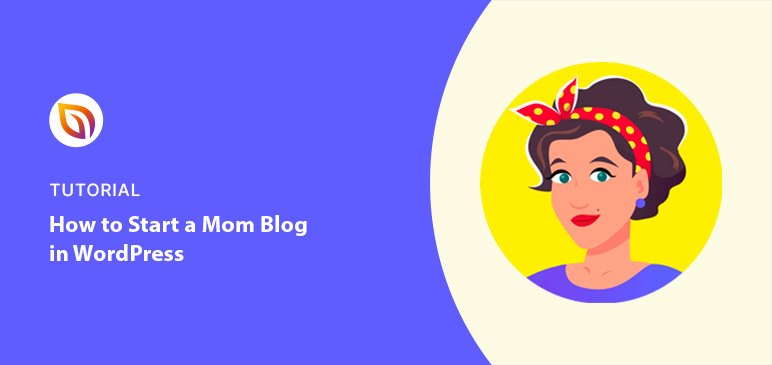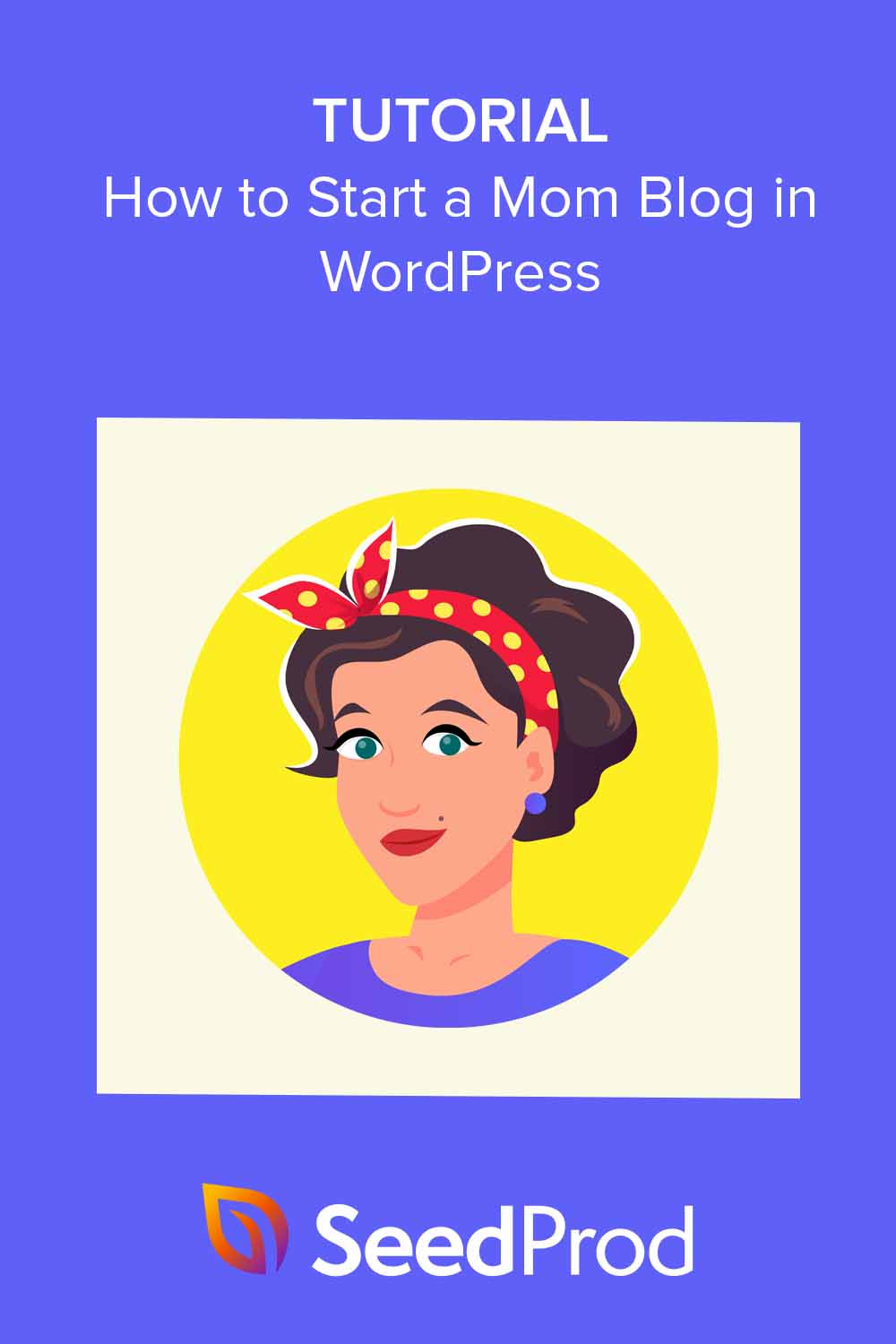Are you wondering how to start a mom blog and make money?
Mom blogs make up a huge portion of the 600 million blogs on the internet. They’re a fantastic way to build community, express yourself, and make money.
You’re in the right place if you’re a mom with a story to tell or a passion to share. I’ll walk you through creating your own mom blog in WordPress, step-by-step.
Table des matières
Why Use WordPress for Your Mom Blog?
If you’re starting a mom blog, your first question is probably how do I choose a blogging platform?
For me, the answer is simple: WordPress is the best option. It powers a huge chunk of the internet — over 43% of all websites — so you know it’s got to be good.
Here’s why it’s perfect for mom bloggers:
- Simple setup: You don’t need to be tech-savvy to create a beautiful website with WordPress. Many beginners find it as easy as using a word processor.
- SEO tools: WordPress offers many tools and plugins to help you optimize your blog for search engines, making it easier for people to find your content.
- Helpful community: If you have questions, the massive WordPress community is always there to lend a hand. You’ll find forums, tutorials, and experts to guide you along the way.
So, if you want a blog that’s easy to manage, can be optimized for search engines, and offers plenty of support, WordPress is the best blogging platform for you.
1. Choose a Niche and Blog Name
Before you dive into starting a mom blog, let’s discuss what your blog will be about. Choosing a niche helps you focus your content and attract a specific audience who shares your interests.
Look at a mommy blog like “The Eco-Friendly Family.”

They zeroed in on eco-conscious parenting, offering tips on sustainable living, green products, and raising environmentally aware kids. This focused approach helped them build a loyal following of parents who value the same things.
Choosing Your Mom Blog Niche
Here are a few ideas to get you started:
- Popular niches: Parenting hacks, recipes for picky eaters, homeschooling tips, budget-friendly family activities.
- Unique niches: Traveling with kids who have special needs, minimalist parenting, raising multilingual children, eco-friendly toy reviews.
Take some time to explore what topics excite you and have growth potential. You can use tools like Google Trends to see what people are searching for online.
Picking the Perfect Blog Name
Once you’ve chosen your niche, it’s time for the fun part: naming your blog. A good blog name should be catchy, memorable, and relevant to your niche. It’s also important to check if the domain name (that’s the website address) is available.
Need some inspiration? Here are a few real-life mommy blog names that hit the mark:
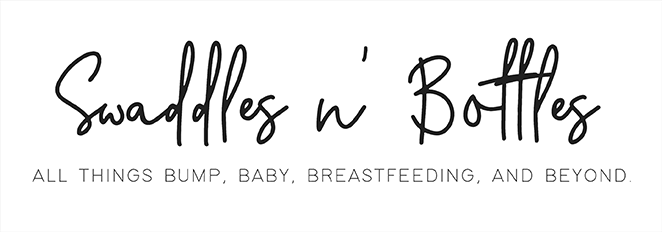
- Swaddles n’ Bottles: This blog focuses on the newborn stage, offering tips and advice on everything from feeding to sleep schedules.
- The Realistic Mama: This blog takes a down-to-earth approach to motherhood, sharing honest stories and relatable experiences.
- Mom on Timeout: This blog offers a fun escape for moms with recipes, DIY projects, and parenting humor.

If you’re stuck, try combining keywords from your niche with words like “mama,” “family,” or “adventures.” Get creative and have fun with it.
After choosing a blog niche and name, you can start setting up your mom blog.
2. Set Up Your WordPress Blog
The first stage in setting up a WordPress blog involves choosing a hosting service and domain name.
Think of your blog as a house. You need land to build it on, right? That’s where web hosting comes in. It’s like the plot of internet land where your blog will live. And just like a house needs an address, your blog needs a domain name so people can find it.
For mommy bloggers, Bluehost is a great choice for both hosting and domain registration. It’s affordable, super easy to use, and even gives you a free domain name for the first year.
Even better, you can install WordPress with just one click. Their helpful support team is available 24/7 and offers free SSL certificates to keep your site secure.
You can also check out our guide on the best WordPress hosting providers to explore other options and find the best fit for your blog.
Setting Up a Blog with Bluehost
For this guide, I’ll walk you through setting up your blog with Bluehost. If you choose a different hosting service, it’s best to check their documentation for specific setup instructions.
To start a blog with Bluehost, click this link to visit the Bluehost website and click the Get Started button.

Next, you’ll be asked to choose a pricing plan. Select the option that best suits your needs and continue.
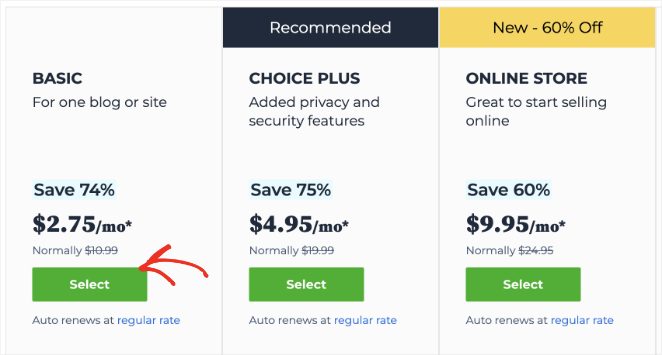
After picking your plan, it’s time to choose a domain name. You can either create a new domain or use an existing one.
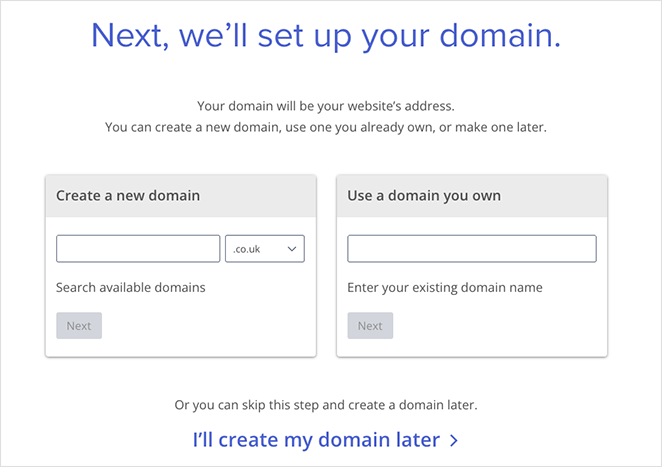
If you don’t already have a domain, choose to Create a new domain and type the mommy blog name you chose in step 1 in the text box. Then, click Next to continue.
Now, enter your account information and select your account plan.

Next, you’ll get an email with your hosting login details. After logging into your Bluehost dashboard, navigate to the My Sites tab, click Log into WordPress, and enter your login information.
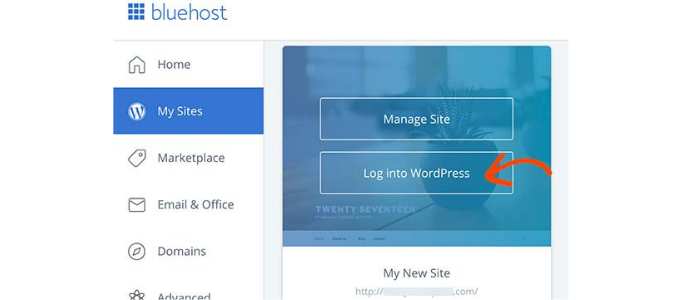
After logging in, click the Create Site button.
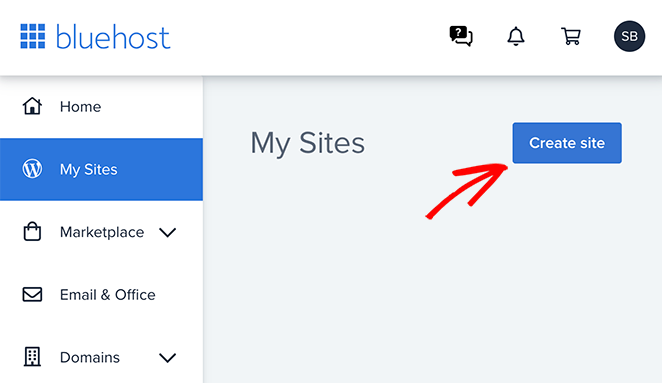
You’ll now see Bluehost’s WordPress installation wizard, which asks you to name your website and choose an optional tagline. Then click Next.
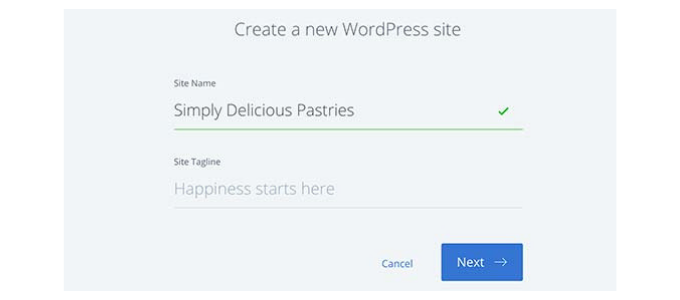
On the next page, select your domain name from the drop-down menu. Leave the directory blank, as Bluehost will choose it for you, and then click Next.
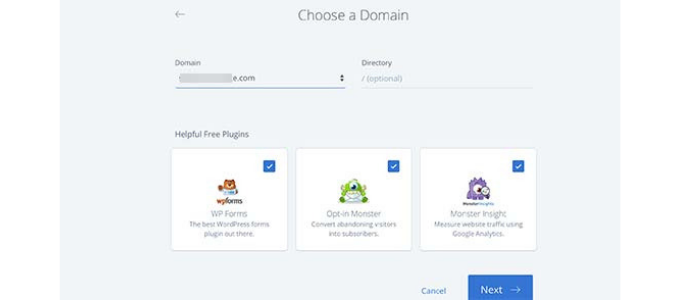
The WordPress installation process will now begin, which could take a few minutes. When WordPress is installed, you’ll see the following success message:
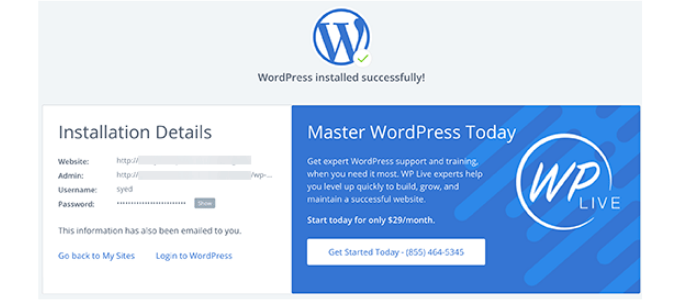
This page will also show your website details, and you’ll also get an email confirmation with a link to your WordPress site’s admin area.
Now that you’ve set your blog’s foundation, it’s time to make it look as awesome as you are.
3. Customize Your Blog Design
It takes people around 50 milliseconds to form an opinion, determining whether they’ll stay or leave your website. Simply put, if your blog isn’t attractive and engaging, people won’t read it, so it needs to look as good as or better than the other mommy blogs out there.
But don’t worry – you won’t need an expert to get yours looking amazing.
WordPress offers thousands of free and premium themes to give your blog a unique look and feel. Choose one that aligns well with your blog niche and is clean and simple, highlighting your blog content.
For example, Astra, a fast, lightweight WordPress theme, has many blog stater designs that you can easily tailor to fit your blog.

For more inspiration, you can also see our list of the best WordPress themes.
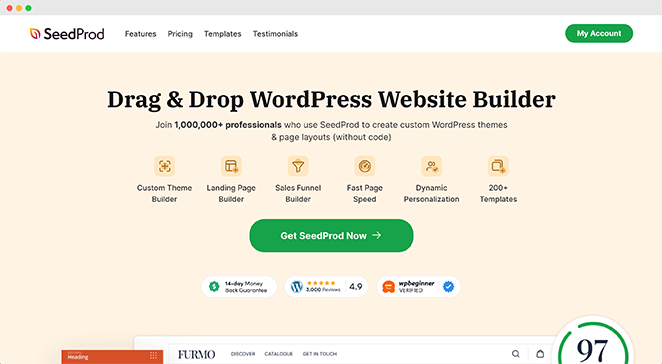
Want to design a unique and professional website without any coding skills? SeedProd makes it a breeze. It has over 300 stunning website templates to give you a head start.

With SeedProd’s easy drag-and-drop builder, you can customize these templates to perfectly match your blog vision. You can add all sorts of fun elements to your pages, like:
- Attention-grabbing headlines
- Beautiful image galleries to showcase your family moments
- Clickable buttons to encourage email signups or direct readers to other parts of your blog
- Social media icons so your audience can connect with you on their favorite platforms
- Eye-catching optin forms to grow your email subscribers
And that’s just the tip of the iceberg. SeedProd offers over 90 pre-made blocks to help you create a truly unique and engaging website.
For detailed instructions, check out our tutorial on how to create a custom WordPress theme with SeedProd.
You can also launch a custom blog in seconds using SeedProd’s AI website builder. Simply provide a brief description of your site, and it will generate a fully custom theme, helping you save time and get online faster.
Must-Have Pages for Your Blog
Besides having a stunning design, your blog needs a few essential pages. These are the heart and soul of your blog, helping readers connect with you, learn more about your story, and easily navigate your content.
Some of the key pages you’ll need include:
À propos de la page
This is where you let your personality shine. Tell readers who you are, what your family is like, and what inspired you to start your blog. Share your passions, experiences, and anything else that makes you unique.

Check out “Honest Mum” for a personal and engaging about page sharing the blogger’s motherhood journey.
Page de contact
Make it easy for readers to contact you. Include a contact form, email address, or links to your social media profiles. This helps build relationships with your audience.
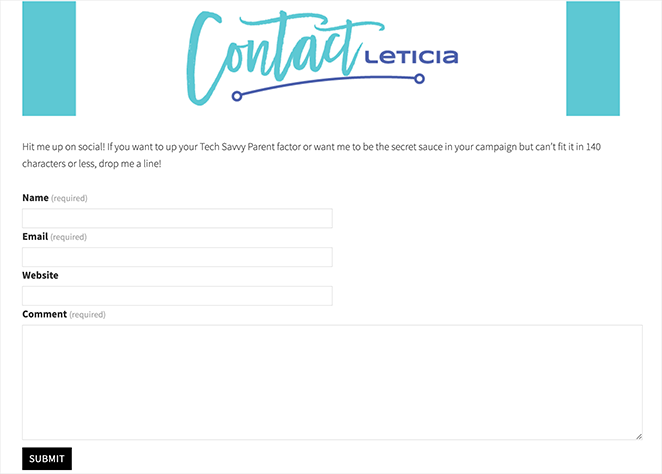
“Tech Savvy Mama” keeps it simple with a contact form. For a similar design, see our guide on how to add a contact form in WordPress.
Privacy Policy Page
This page is essential for legal reasons. It explains how you collect, use, and protect your readers’ data. You can find templates online to help you create one.
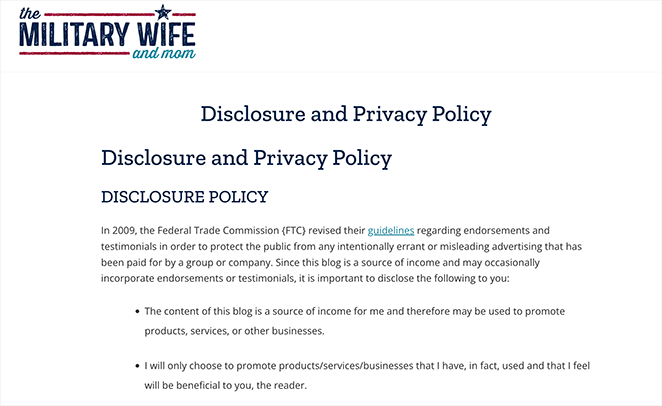
”The Military Wife and Mom” provides a detailed and easy-to-understand privacy policy that covers all the bases.
SeedProd makes it super easy to create these pages with its drag-and-drop builder and pre-made templates. You can design beautiful and functional pages in minutes, even if you’re not a tech whiz.
For a step-by-step guide, head over to our tutorial on how to create a custom page in WordPress.
4. Install Essential WordPress Plugins
Now that your blog is looking fabulous, let’s add some superpowers. WordPress plugins are like apps for your blog. They add all sorts of cool features and help your site run smoothly.
But with over 64,000, finding the ones you’ll need is daunting. That’s why I’ve put together a short list of essential plugins every blog should have:
1. All in One SEO (AIOSEO)
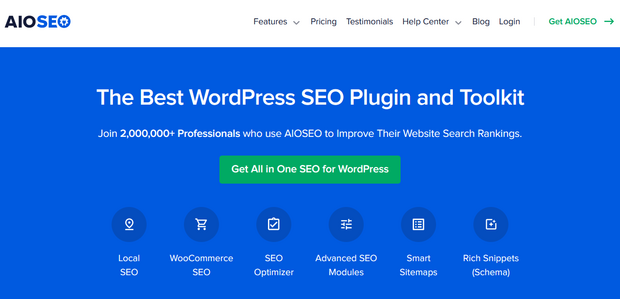
This handy plugin helps you optimize your blog for search engines like Google. That means more people can find your amazing content when they search online.
AIOSEO guides you through the SEO process, even if you’re a beginner. It helps you choose the right keywords, create SEO-friendly titles, and more.
2. MonsterInsights
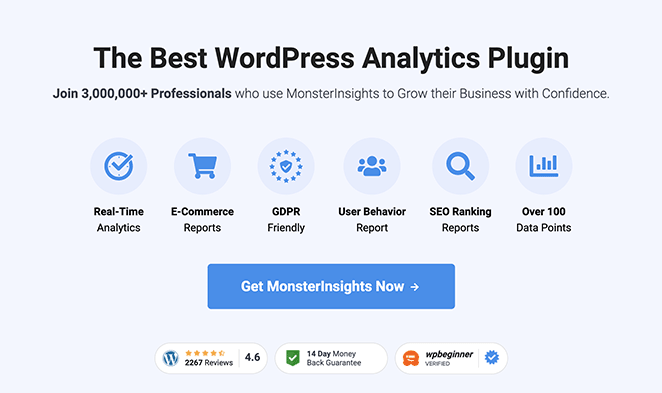
Want to know how many people are visiting your blog and what they’re reading? MonsterInsights makes it easy to connect your blog to Google Analytics, a powerful tool that tracks your website traffic.
You can see which posts are most popular, where your visitors are coming from, and what devices they use. This info helps you create content that your readers love.
3. Sucuri
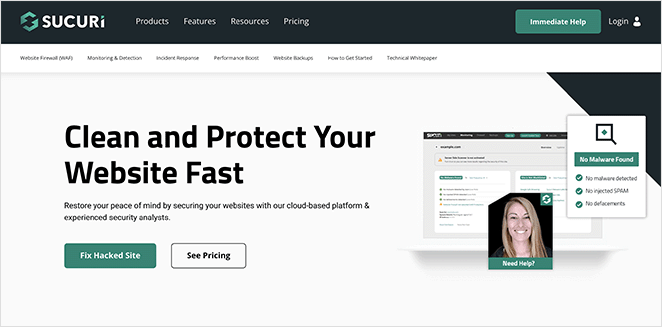
Security is super important for any website, especially if you’re collecting email addresses or other personal information. Sucuri is like a security guard for your blog. It scans for malware, blocks hackers, and protects your site from attacks.
4. Duplicator
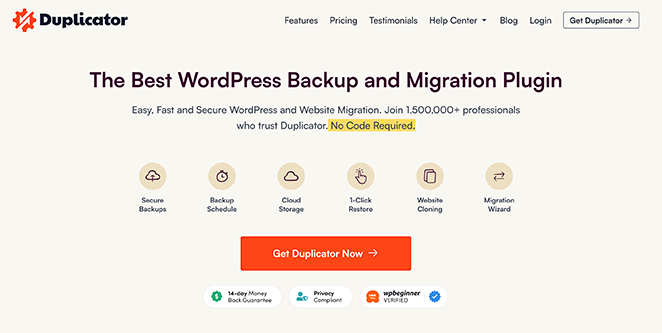
Imagine losing all your hard work because of a technical glitch. Yikes! That’s where Duplicator comes in.
It creates backups of your entire website so you can quickly restore it if something goes wrong. It’s like having a safety net for your blog.
5. WP Rocket
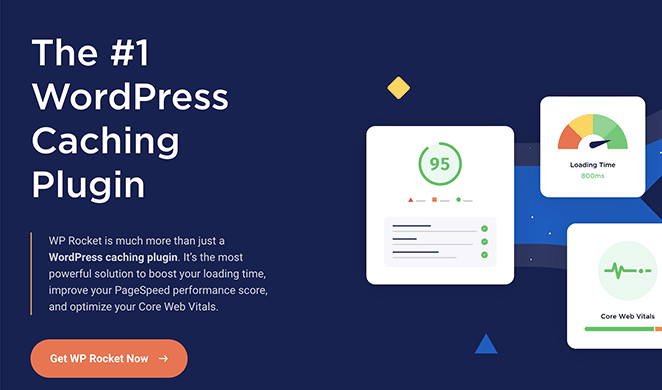
Nobody likes a slow website. WP Rocket is a caching plugin that makes your blog load faster, which keeps your readers happy and coming back for more.
It also helps improve your SEO, as search engines favor fast-loading sites.
These are just a few of the WordPress plugins available. Check out our list of the best WordPress plugins for more ideas on how to enhance your blog even further.
5. Create Engaging Content
Now that your blog is running, it’s time to fill it with content your readers will love. In my experience, developing some core content pillars is the easiest way to do this.
According to Buffer:
“A content pillar is a key theme or topic you want to focus on in your content and become known to your audience. Most creators have a combination of several pillars that form the foundation of their content strategy.”
Content pillars help you control “what you’re known for” and how people define your content when explaining it to others. Therefore, they should align with your niche and the interests of your target audience.
Here are a few examples of popular content pillars from successful mom blogs:
- Parenting Tips: Share advice on discipline, child development, education, or other parenting challenges.
- Recipes: Quick and easy meals for busy moms, healthy snacks for kids, or special occasion recipes for the whole family.
- Travel Stories: Share your family adventures, budget-friendly travel tips, or destination guides for family vacations.
- Personal Essays: Open up about your experiences as a mom, the ups and downs of parenting, or the lessons you’ve learned along the way.
Once you know which topics you’ll create content around, you can build a calendar that fits the creation process into your busy schedule.
Creating a Content Calendar
Planning your content can help you stay organized and consistent with your posting schedule. It’s like a roadmap: You map out your blog post ideas, set deadlines, and cover all your content pillars.
There are plenty of free templates and tools available online to help you create a content calendar that works for you.
Personally, I use Asana to plan the content for our blog. I include simple fields for the blog title, due date, post type, and status, to name a few. It’s easy to customize to suit your workflow and keeps everything organized.
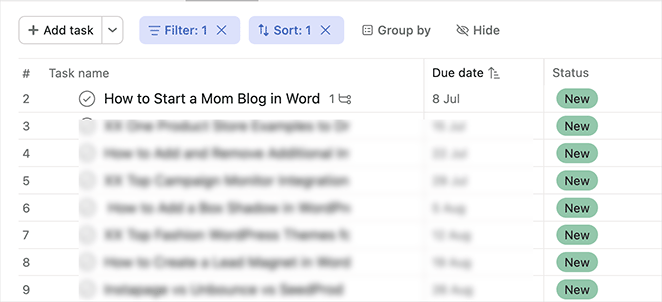
I particularly like the Calendar view, which helps me visualize what I have scheduled every month.
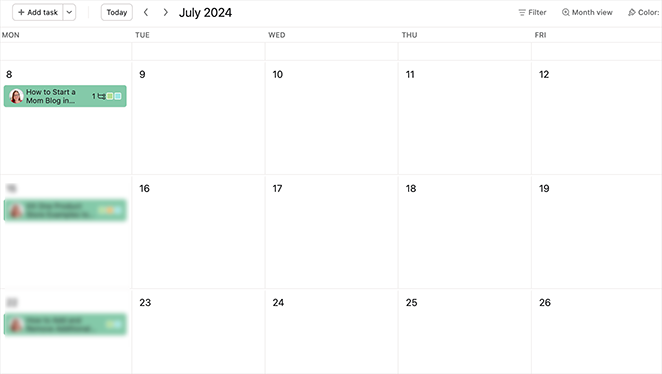
Tips for Writing Engaging Blog Posts
Creating a beautiful blog is only half the battle. Now comes the real fun – filling it with captivating content that leaves your readers wanting more.
Here are some tips to make your blog shine:
- Be authentic: Share your personal experiences, thoughts, and feelings. Readers love to connect with real people. Don’t be afraid to show your vulnerability and let your personality shine through your writing.
- Tell stories: People are naturally drawn to stories. Instead of just stating facts, use storytelling to make your posts more engaging and relatable. Share anecdotes, personal experiences, or even funny stories about your kids.
- Use visuals: Break up your text with eye-catching images, fun videos, or informative infographics. This makes your posts more visually appealing and easier to digest.
- Use a conversational tone: Write like you’re talking to a friend over coffee. This helps create a warm and inviting atmosphere for your readers.
- Proofread and edit: Before hitting publish, ensure your blog post is free of errors and easy to read. A polished post shows that you care about your content and your readers.
6. Promote Your Mom Blog
You’ve poured your heart into creating your blog; now it’s time to share it with the world. Promoting your mom blog isn’t just about getting more readers – it’s about connecting with other moms, building a supportive community, and making your voice heard.
Médias sociaux
Social media is a fantastic way to reach moms who share your interests. It’s like a virtual playground where you can chat, share stories, and build relationships. But with so many platforms, which ones are best for mom bloggers?

Here are a few ideas:
- Facebook: Perfect for joining mom groups, participating in discussions, and sharing your blog posts with a wider audience.
- Instagram: Great for visually appealing content like photos and short videos. Use Instagram Stories to give your followers a glimpse into your daily life.
- Pinterest: This platform is a goldmine for mom blogging, especially if your niche involves recipes, DIY projects, or home decor. Create eye-catching pins that link back to your top posts.
- TikTok: This short-form video platform can be a fun way to showcase your personality, share quick tips, or participate in viral trends. It’s a great way to reach younger audiences and add a creative touch to your blog promotion.
Marketing par courrier électronique
Building an email list is like having a group of loyal fans eager to hear from you. Send regular newsletters with your latest blog posts, exclusive content, or special offers. This keeps your readers engaged and coming back for more.
See our guide to learn how to build an email list.
To make your newsletters irresistible, try:
- Personalizing your emails with the reader’s name
- Keeping your subject lines short and catchy
- Including a clear call to action (like clicking a link to read a blog post)
- Sharing personal anecdotes or behind-the-scenes glimpses into your life
SEO Strategies
SEO stands for Search Engine Optimization. It’s a fancy way of saying, “making your blog appear in search results.” This involves using relevant keywords, optimizing page titles and descriptions, and building backlinks from other websites.
If SEO sounds overwhelming, don’t worry. Here’s a WordPress search engine optimization guide that can help you get started.
Community Engagement
Don’t be afraid to get involved in online mom communities. Join Facebook groups, participate in forums, or comment or start guest blogging on other blogs.
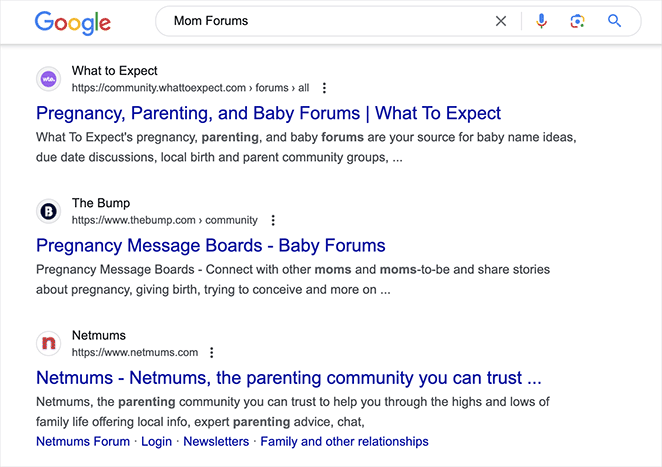
You can even join relevant subreddits like r/beyondthebump and share your parenting expertise with other parents.
Building relationships with other bloggers and readers will naturally attract more visitors to your site.
7. Monetize Your Mom Blog
Turning your passion project into a source of income is the dream, right? Monetizing your mom blog can help you make money, cover your blogging expenses, or even replace your full-time job.
The good news is that there are plenty of ways to make money blogging. Let’s dive into a few of the most popular methods.
Marketing d'affiliation
With affiliate marketing, you share products or services you love with your readers and include a special link. When someone clicks your link and makes a purchase, you earn a commission.
It’s a win-win: your readers discover great products, and you get rewarded for your recommendation.
To make money blogging with affiliate marketing, join affiliate programs like ShareASale and choose products you already use to promote.
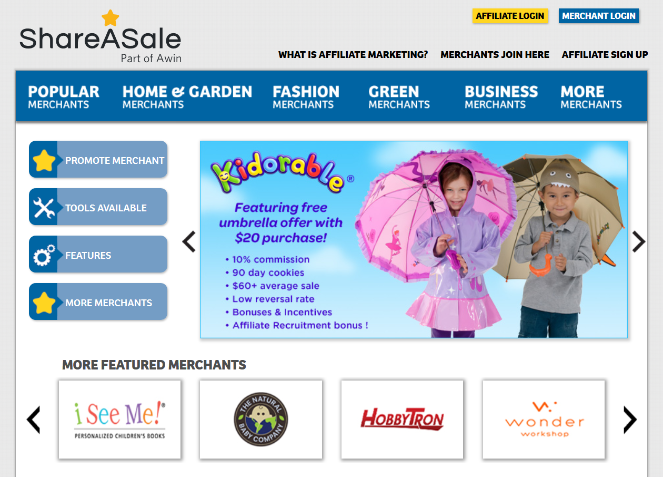
Because you trust and are familiar with each product, your audience will sense your passion and personal observations.
Conseil d'expert

“In my experience, it is better to recommend a few quality products that you believe in than a huge list of products that you know nothing about.”
Blair Williams, Founder of Pretty Links.
Sponsored Posts
Companies are always looking for ways to reach their target audience, and your mom blog might be the perfect platform.
Sponsored content is a form of advertising where you get paid to write about a brand or product. You can share your honest opinion while getting compensated for your time and influence.
Display Advertising
Display advertising can be a simple way to earn passive income if you’re getting a good amount of traffic to your blog.
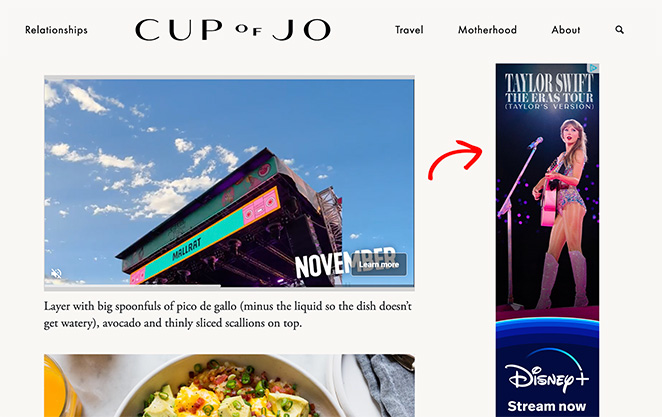
You can sign up for ad networks like Google AdSense, which will display ads on your blog. You earn money whenever someone clicks on an ad.
Digital Downloads
Share your knowledge and expertise by creating and selling digital products like ebooks, printables, templates, or online courses.
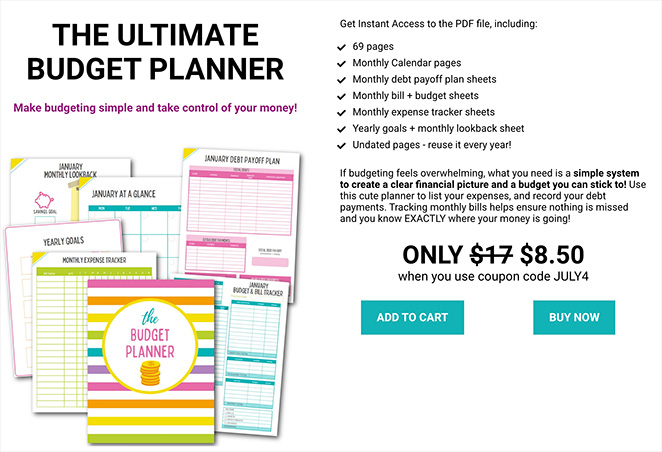
This is a great way to monetize your skills and provide value to your readers. You can even offer exclusive discounts to your email subscribers.
Conseil d'expert

“Compared with selling physical products, digital downloads are a breeze. There’s no need to keep track of inventory, no running out of stock, no need to hire storage space or workers to manage it, and no shipping and handling.”
Chris Klosowski, President of Easy Digital Downloads.
Successful Mom Blog Examples
Ready to be inspired? Here are a few parenting blogs that have found amazing success using WordPress.
Pinch of Yum
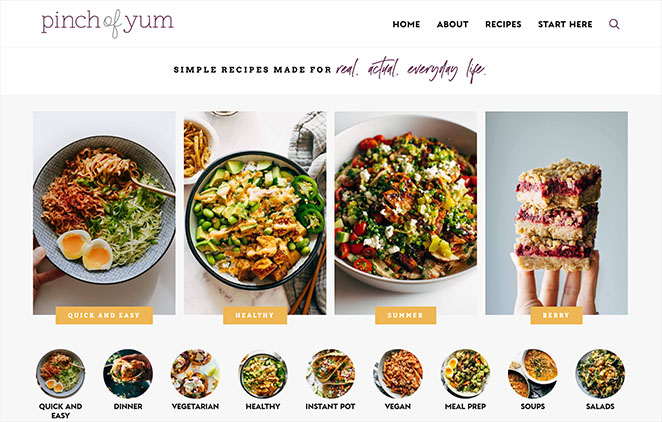
This popular food blog started as a hobby for Lindsay, a teacher turned food blogger. It now generates a six-figure income through recipe development, photography, and affiliate links.
Scary Mommy

This online community for moms offers parenting advice, funny stories, and personal essays. With millions of monthly visitors, Scary Mommy has become a household name in the parenting world.
What Moms Love
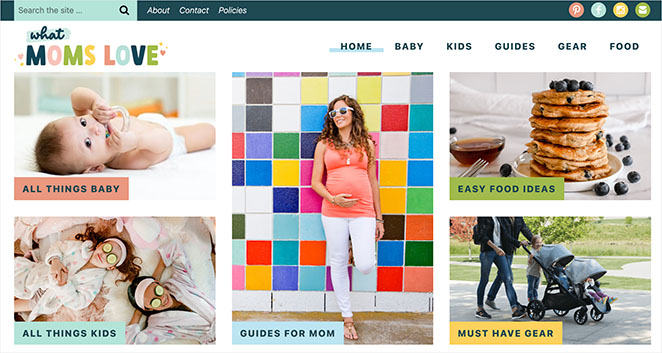
This blog features curated gift guides, product reviews, and family travel tips. The founder, Aly, has grown her blog into a thriving business with multiple income streams.
These are just a few examples of the incredible success you can achieve by starting a blog built on WordPress. For even more inspiration, check out these stunning blog layout examples.
Start Your Mom Blog Today
I hope this guide showed you the steps to start a mom blog in WordPress and earn passive income from your efforts. Now, you have the tools to make money from your home, and in time, you could turn your blog into a full-blown business for your family.
So go ahead, create your mom blog, and share your authentic self with the world.
Don’t forget to check out our handy checklist for launching a website to ensure you’ve covered all your bases. And if travel is more your thing, see our guide on how to start a travel blog and make money.
Merci de votre lecture ! Nous aimerions connaître votre avis, alors n'hésitez pas à laisser un commentaire pour nous faire part de vos questions et de vos réactions.
Vous pouvez également nous suivre sur YouTube, X (anciennement Twitter) et Facebook pour obtenir d'autres contenus utiles au développement de votre entreprise.

